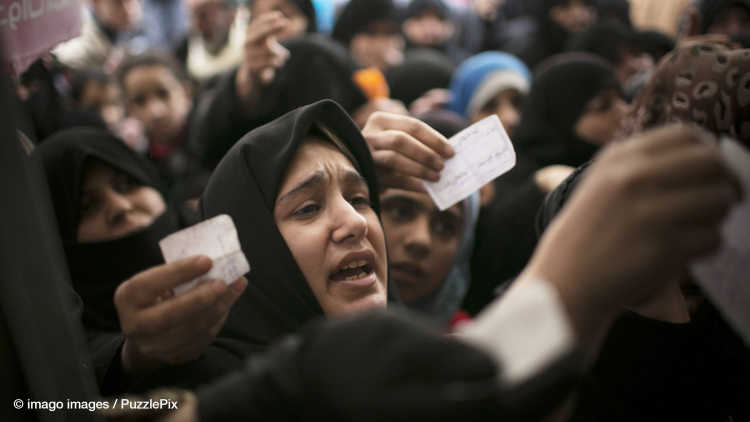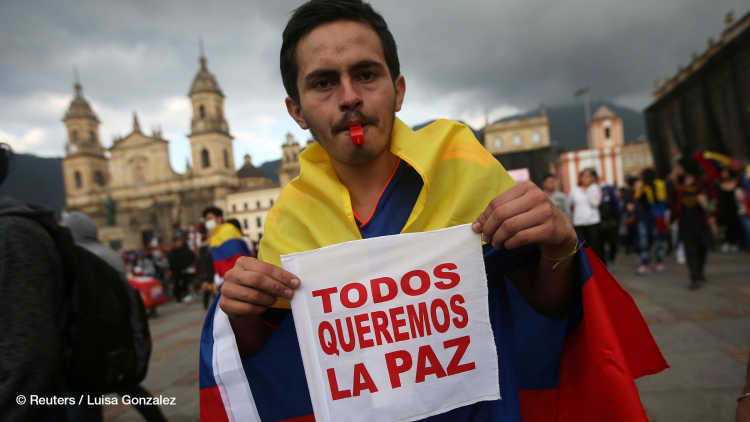- Startseite
- Publikationen
- GIGA Focus
- Bringing Afghan Women to the Table: How to Negotiate with the Taliban
GIGA Focus Asien
Bringing Afghan Women to the Table: How to Negotiate with the Taliban
Nummer 2 | 2022 | ISSN: 1862-359X

Norway’s and Switzerland’s recent hosting of the de facto Taliban regime representatives in early 2022 has overshadowed the risks to women and their rights in the aftermath of the US withdrawal from Afghanistan in August 2021. Unless international and European policymakers make significant policy interventions while engaging with the de facto Taliban regime, these risks will only escalate.
Women’s exclusion in Afghanistan was aggravated after the US/Pakistani/Saudi-backed jihad against the Soviet invasion between 1979 and 1989, where cultural conservatism in rural parts merged with religious extremism.
Between 1979 and 2001, Afghanistan witnessed high levels of conflict and the rising prominence of ultraconservative religious clerics and leaders in the country’s socio-political makeup. As a result, the first Taliban regime (1996–2001) imposed religion-inspired laws that placed strict restrictions on women in their public and private lives.
Following the 9/11 attacks, the Taliban regime was overthrown in October 2001 by the US-led coalition. During the two-decade US presence in the country, and with support from European partners, significant gains were made in providing more education and professional opportunities to women.
With the Taliban back in power, these gains now risk being rolled back, and international stakeholders are facing a catch-22. There remains a dilemma regarding whether Afghanistan should be seen from a humanitarian perspective (focusing on avoiding mass starvation) or from a security perspective (with the emphasis being on not engaging with a violent group such as the Taliban). Major policy decisions, therefore, need to be made soon.
Policy Implications
To avoid an enormous humanitarian disaster in Afghanistan, some level of engagement with the Taliban is required. Switzerland has followed Norway’s lead in informally engaging with the Taliban. Such initiatives can bring sustainable results only if engagement with the Taliban includes Afghan women. If Taliban delegations excluding women are accepted in engagements with European counterparts, the group will be further emboldened to persist with exclusionary policies at home.
The Taliban Takeover of Afghanistan
The sudden US withdrawal from Afghanistan in August 2021 took many by surprise. Though the withdrawal was inevitable, especially after the US–Taliban Doha talks, the style in which it came about and the ease with which the Taliban regained control of Afghanistan was less than expected. Soon after, the international community started giving hints that sooner or later, some form of engagement with the de facto Taliban regime will take place. Norway was the first country to officially invite the regime to talks, welcoming a Taliban delegation, along with several Afghan civil society members and activists, to Oslo in January 2022. It was also reported on 8 February 2022 that Geneva Call (an NGO based in Geneva) had invited a Taliban delegation to discuss humanitarian concerns in Afghanistan. On paper, these initiatives are important to avert a major humanitarian disaster in Afghanistan.
At the same time, space for women has been constantly shrinking since the Taliban came to power, and women’s rights activists in Afghanistan are being attacked and detained by the regime. On 28 February 2022 the Taliban also restricted Afghans from leaving the country and announced that women intending to study abroad could leave only if accompanied by a male guardian (Reuters 2022). European negotiators should be aware of these developments while engaging the de facto Taliban regime and emphasise preserving the gains made towards equal rights in the last two decades.
Women before the Taliban Takeover(s)
Afghanistan boasts a complex political and ethnic makeup, where internal frictions between various groups have historically existed. Due to these frictions and periodic conflicts, women have often suffered and have had little say in policy and decision-making. However, the widespread belief that the provision of equal rights for women was made possible only during the US-led coalition presence in Afghanistan is inaccurate. In fact, major improvements towards equal rights were made more than a century ago. It was during King Abdur Rahman Khan’s reign (1880–1901) that some of the laws detrimental to women were either eliminated or modified, such as the obligation for a woman to marry her deceased husband’s next of kin (Ahmed-Ghosh 2003). In terms of other landmark developments concerning women’s rights, Afghan women became eligible to vote in 1919, the first girls’ school opened in 1921, and the country’s 1964 constitution proclaimed equal rights for all (UN Women – Afghanistan 2021). The notion and general perception that Afghanistan has remained a rugged and “primitive” society, as described in colonial literature, does not correspond with reality (Yousaf 2021). Similarly, in Afghanistan’s history, women have often claimed space and played a role in politics, governance, and resistance. Therefore, it is important to briefly dissect political developments in Afghanistan in the twentieth century.
Between 1930 and 1978, Afghanistan witnessed what many call its “golden period.” The country saw relative stability, infrastructural development, and nation-building. Thomas E. Gouttierre, former director of the Center for Afghanistan Studies at the University of Nebraska, who lived in Afghanistan between 1964 and 1974, called Afghanistan very “governable” during that period (Bumiller 2009). After President Muhammad Daud Khan’s assassination on 28 April 1978 and the subsequent invasion of the Soviet army in 1979, Afghanistan entered a phase of protracted conflict. This conflict escalated after an alliance between the United States, Pakistan, and Saudi Arabia resulted in the military training of Afghan refugees in Pakistan. The trained refugees were sent back to Afghanistan to fight against the Soviets as the so-called mujahideen. After the Soviet withdrawal in 1989 and until the Taliban’s first takeover in 1996, Afghanistan witnessed a bloody civil war and instability leading to mass displacement and casualties among the Afghan people. The first period of Taliban rule (1996–2001) led to some of the worst circumstances for women in the country’s history. Women were punished and executed publicly, as well as forced out of many professional jobs. Widows, responsible for their families, were not allowed to work. It was due to these harsh policies that soon after the 9/11 attacks leading to the US-led coalition’s overthrowing of the Taliban regime, Afghan women hoped for a better future in their country.
The US-led state-building project in Afghanistan between 2001 and 2021 did introduce and implement some positive initiatives. Some of these measures, albeit more focused on the urban centres, resulted in presidential elections; institution-building; investment in the economy, healthcare, and education; and more professional opportunities for women. Women were able to pursue careers in journalism, the arts, and the entertainment field – something unheard of during the Taliban’s first rule. These gains came after prominent European states such as Germany, along with the United States, engaged in development cooperation with the Afghan government and civil society between 2002 and 2021. Germany contributed to gender equality in Afghanistan through the Deutsche Gesellschaft für Internationale Zusammenarbeit (GIZ), which engaged with indigenous Afghan organisations to improve legal awareness among women and empower female jurists and police officers.
It was due to the coalition’s efforts that Afghanistan adopted its first National Action Plan on Women, Peace and Security in 2015, based around the pillars of participation, protection, prevention, and relief and recovery. However, when the US administration decided to formally initiate the so-called peace talks with the Taliban in Doha, principles of equal representation were negated, and the talks took place mostly between men. It was this exclusion of women and the newly gained Taliban legitimacy that emboldened them to sideline women from policymaking and governance positions soon after their takeover in August 2021. Before the Taliban’s takeover, women’s rights activists had rightly predicted and warned that the extent to which women were included in the US–Taliban peace talks in Doha would shape the future of liberties women hold in Afghanistan. As a result, gains made by the United States and Europe in terms of women’s rights now risk being rolled back by the Taliban.
Women after the Taliban’s 2021 Takeover
The Taliban and its supporters define women’s rights through the prism of patriarchal and conservative interpretations and expectations vis-à-vis women’s roles in Afghan society. Similarly, discussions on women’s rights by the Taliban and its supporters often end in a critique of Western values, complete with sarcastic insinuations. In November 2021 a pro-Taliban cleric posted an unverified photo, tweeting the following caption in Pashto (Ziaurhmanazhgar 2021):

Author’s Translation: “In Holland, a boy married a goat. Those who demand women’s rights from us [the Taliban] have given their women’s rights to animals.”
The derogatory tweet highlights the disingenuousness of the Taliban towards women’s rights and indicates an important discrepancy in the Taliban’s messaging on electronic and social media: The supposedly “new” Taliban (or Taliban 2.0, as the media called it initially) have become smarter in their messaging when it comes to using different languages for local and international content consumption (Yousaf and Jabarkhail 2021). Where English-language statements coming from Taliban spokesmen on women’s rights are somewhat measured, statements in local languages (Pashto and Dari), especially on social media, are often harsh and carry a threatening tone. Women, especially rights activists, are not only arrested but also openly threatened on social media for their actions by Taliban affiliates, particularly in live chat rooms in Twitter Spaces (a feature introduced by Twitter that represents a new way to have live audio conversations – anyone can join them).
Mubeen Khan – a famous cleric and Taliban social media personality – has become notorious for openly threatening Afghan women on social media. Soon after an anti-burqa (Afghan cultural veil) protest in January 2022 in Kabul, Khan, while speaking in a Twitter Space warned that the “Islamic Emirate” (read: Taliban) would take strict action against “these women” (who took part in the protest). He further advised that the Islamic Emirate would not allow anyone to “insult” the religious and cultural values of the country (Salehi 2022). Days following his threat, the Taliban raided houses of women activists involved in the protest, arresting some (Gannon 2022). After public outcry over the arrests, Khan called the arrested activists liars and warned that “anyone who disrupted the public must be arrested.” He further warned that “an order had gone to all security forces to arrest them (women activists) and bring them to justice” (Zucchino and Akbary 2022). Such intentions and statements highlight the continuing risks women in Afghanistan face under the current de facto Taliban regime. The present situation and the risks faced by Afghan women, therefore, also create policymaking complications for international stakeholders, particularly the European Union, as they attempt to send humanitarian and financial aid to Afghanistan.
Policymaking for a Taliban-Governed Afghanistan
The international community, particularly the European Union, is faced with a catch-22 when it comes to negotiating with the de facto Taliban regime. On the one hand, the international community is hesitant to provide the Taliban with the recognition and legitimacy it seeks to consolidate its rule by formally negotiating with international stakeholders. On the other hand, Afghanistan is faced with one of the biggest humanitarian disasters in the world, with most of its population at risk of starvation. The level of diplomatic and financial engagement required to avert this disaster will be perceived and used by the Taliban as a legitimisation of their regime. However, engagement along these lines will likely invite resistance from those Afghan women and civil society organisations that support liberal values and desire a more inclusive society in Afghanistan.
Role of the European Union
Important EU member and associate states – such as Germany, France, Norway, Sweden, Denmark, and Switzerland – now face the policy challenge of resolving Afghanistan’s economic woes, which would require negotiating with the Taliban. The Oslo talks, despite being a positive first step, nevertheless highlight various complications and issues that need addressing in Afghanistan. Afghans in Europe have held protests against such initiatives (ANI 2022; DW 2022). They demand that the Taliban be held accountable for their human rights violations, and they urge potential partners to resist providing the de facto regime with the legitimacy it seeks from the international community.
Similarly, it was reported that a Taliban delegation was informally invited to Switzerland by Geneva Call to hold talks with Swiss officials and humanitarian experts in Geneva. Geneva Call, through a tweet on 10 February 2022, announced that the Taliban delegation had “adopted a humanitarian declaration after high-level discussions in Geneva” (Geneva Call 2022). The declaration covered crucial issues including the protection and provision of healthcare and education for all Afghans, respect for humanitarian aid, and the safeguarding of the environment and cultural heritage (Geneva Call 2022). While many see the declaration as a positive development, most of the comments from young Afghans on Geneva Call’s social media pages highlight a broader resentment towards “legitimising” the Taliban. These Afghan critics of the Taliban view these initiatives as similar to the Doha talks, where women and civil society members were likewise excluded. Though the Swiss authorities maintain that the invitation and the visit were not meant to provide legitimacy to the Taliban, such dialogues and invitations, after all, carry some perception of legitimacy.
For any future events and invitations vis-à-vis Taliban delegations, representation of Afghan women should be a bare-minimum requirement. If the Taliban resist, this requirement can also be fulfilled by using financial and political leverage in any way possible. Development aid for Afghanistan, where possible, should also contain provisions and conditions related to investment in girls’ education and professional opportunities for Afghan women.
Finally, as discussed above, the Taliban have become smarter in how they manage and disseminate messages on social media in different languages. Conciliatory statements in English and threats in Pashto and Dari mean that international partners engaging with the Taliban also need to keep a vigilant eye on the Taliban’s messaging and statements in local languages. This would allow international partners to keep better track of the Taliban’s positions and commitments regarding gender equality and human rights.
Indigenous Voices in Policymaking
In the words of Bina D’Costa, “knowledge is being produced about people who are actual repositories of knowledge and we have cared little to learn from them” (D’Costa 2021: 600). The same dilemma applies to Afghanistan, where a significant portion of post-9/11 policymaking took inspiration from non-indigenous stakeholders and many local stakeholders were excluded. A similar trend can be witnessed since the US withdrawal. The Taliban, who are in power but represent the views of only a small proportion of Afghan society and the overall ethnic Pashtun population, are at the forefront of negotiations and engagement with the international community.
Though Norway took a positive step in this regard by also inviting Afghan women, there is a long way to go to ensuring that all Afghan voices are heard in policymaking circles. Sustainable and durable peace in Afghanistan can be ensured only if due agency is afforded to women, who, over the past four decades, have been relegated to the sidelines of policymaking processes. The inclusion of women experts, politicians, and policymakers presents a political and a cultural challenge, particularly when it comes to the conservative and patriarchal rural societies. Nonetheless, any effort towards peace and conflict resolution will succeed only if Afghan women have a seat at the policymaking table. The more a male-dominant and ultraconservative group such as the Taliban engages and negotiates with women in the presence of European and international negotiators, the better the chances are of changing and challenging the Taliban’s perceptions, policies, and worldviews.
Finding Common Ground on Ethnic Issues
Besides working towards strengthening women’s rights, EU negotiators should also consider ethnic cleavages in Afghanistan. After the fall of the first Taliban regime in 2001, the US-led coalition, along with the European Union, made efforts to find common ground between different Afghan ethnic groups and form a united government. However, an initial delay in the Bonn Conference, leading to the Northern Alliance’s (NA) capturing of two-thirds of the country, meant that the NA received a majority stake in the interim setup (Vendrell 2012). The Taliban is a predominantly ethnic Pashtun group. Also, Afghanistan has historically been ruled by Pashtuns, so other major ethnic groups – such as Uzbeks, Tajiks, and Hazaras – naturally carry some resentment towards continued Pashtun rule. Therefore, the return of the Taliban has already escalated the risk of ethnic divide within the country. To find common ground now, the European Union can follow the Bonn template but must ensure that all major ethnic groups get their due representation in negotiations concerning Afghanistan. This representation should also consist of Afghan women, and not only men.
Humanitarian vs. Security Approach: The Way Forward
The Taliban’s takeover of Afghanistan has presented international stakeholders with the dilemma of whether Afghanistan should be regarded from a security perspective or a humanitarian perspective. The Taliban, until recently, was considered a terrorist group. Therefore, its taking over of Afghanistan creates potential security (e.g. al-Qaida and Islamic State) and humanitarian (e.g. mass displacement and economic) problems. The United States has so far seen Afghanistan only from a security perspective. EU member states and associates, particularly Norway and Switzerland, have adopted a relatively balanced approach by also incorporating the humanitarian perspective into their initiatives.
However, several women’s rights activists in Afghanistan are either missing or have reportedly been arrested by the Taliban. Moreover, Taliban spokesperson Zabiullah Mujahid also recently announced that Afghans would no longer be allowed to leave the country. This has created further fears and risks for activists wanting to leave the country. At the same time, the country is also facing a humanitarian emergency, with the Afghan population at risk of mass starvation. To address this potential humanitarian disaster, international and EU aid agencies will need to go through the Taliban to help the Afghan people in need. This would require further engagement with the group on the Oslo and Geneva models. However, this engagement should take place only if Afghan civil society members and women are included in the process.
Fußnoten
References
Ahmed-Ghosh, Huma (2003), A History of Women in Afghanistan: Lessons Learnt for the Future or Yesterdays and Tomorrow: Women in Afghanistan, in: Journal of International Women’s Studies, 4, 3, 1–14.
ANI (2022), Germany: Protesters Raise Anti-Taliban Slogans at Swiss Consulate in Munich, accessed 1 March 2022.
Bumiller, Elisabeth (2009), Remembering Afghanistan’s Golden Age, accessed 9 February 2022.
D’Costa, Bina (2021), Learning/Unlearning in International Relations through the Politics of Margins and Silence, in: Australian Journal of International Affairs, 75, 6, 591–603.
DW (2022), Afghan Protesters in Oslo Slam Western Talks with the Taliban, accessed 1 March 2022.
Gannon, Kathy (2022), Taliban Storm Kabul Apartment, Arrest Activist and Her Sisters, accessed 10 February 2022.
Geneva-Call (2022), Geneva Call is Pleased to Announce that..., accessed 11 February 2022.
Reuters (2022), Taliban Restrict Afghans Going Abroad, Raises Concern from U.S. and UK, accessed 1 March 2022.
Salehi, Samir (2022), General Mobin, Where are the Protesting Girls?, accessed 13 February 2022.
UN Women – Afghanistan (2021), 1919 - Afghan Women Became Eligible to Vote..., accessed 15 February 2022.
Vendrell, Francesc (2012), What Went Wrong after Bonn, accessed 12 February 2022.
Yousaf, Farooq (2021), The ‘Savage’ Pathan (Pashtun) and the Postcolonial Burden, in: Critical Studies on Security, 9, 1, 36–39.
Yousaf, Farooq, and Moheb Jabarkhail (2021), Afghanistan’s Future under the Taliban Regime: Engagement or Isolation?, in: Journal of Policing, Intelligence and Counter Terrorism, online first 3 October, DOI: https://doi.org/10.1080/18335330.2021.1982139.
Ziaurhmanazhgar (2021), In Holland, a Boy Married a Goat (translation)..., accessed 11 February 2022.
Zucchino, David, and Yaqoob Akbary (2022), Threatened and Beaten, Afghan Women Defy Taliban With Protests, accessed 9 February 2022.
Gesamtredaktion GIGA Focus
Redaktion GIGA Focus Asien
Lektorat GIGA Focus Asien
Forschungsprojekt
Regionalinstitute
Wie man diesen Artikel zitiert
Yousaf, Farooq (2022), Bringing Afghan Women to the Table: How to Negotiate with the Taliban, GIGA Focus Asien, 2, Hamburg: German Institute for Global and Area Studies (GIGA), https://doi.org/10.57671/gfas-22022
Impressum
Der GIGA Focus ist eine Open-Access-Publikation. Sie kann kostenfrei im Internet gelesen und heruntergeladen werden unter www.giga-hamburg.de/de/publikationen/giga-focus und darf gemäß den Bedingungen der Creative-Commons-Lizenz Attribution-No Derivative Works 3.0 frei vervielfältigt, verbreitet und öffentlich zugänglich gemacht werden. Dies umfasst insbesondere: korrekte Angabe der Erstveröffentlichung als GIGA Focus, keine Bearbeitung oder Kürzung.
Das German Institute for Global and Area Studies (GIGA) – Leibniz-Institut für Globale und Regionale Studien in Hamburg gibt Focus-Reihen zu Afrika, Asien, Lateinamerika, Nahost und zu globalen Fragen heraus. Der GIGA Focus wird vom GIGA redaktionell gestaltet. Die vertretenen Auffassungen stellen die der Autorinnen und Autoren und nicht unbedingt die des Instituts dar. Die Verfassenden sind für den Inhalt ihrer Beiträge verantwortlich. Irrtümer und Auslassungen bleiben vorbehalten. Das GIGA und die Autorinnen und Autoren haften nicht für Richtigkeit und Vollständigkeit oder für Konsequenzen, die sich aus der Nutzung der bereitgestellten Informationen ergeben.




















